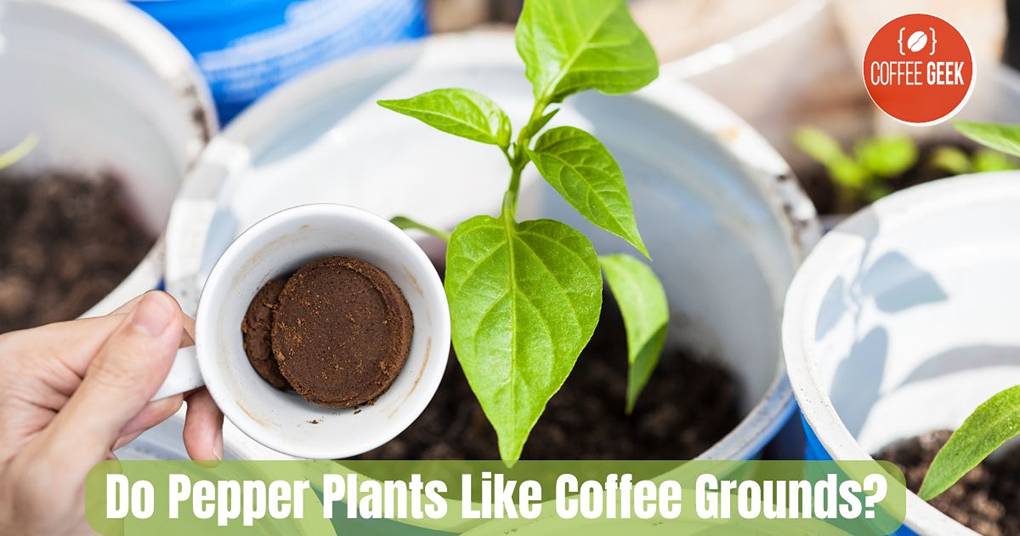Pepper plants are known for their eagerness to grow and thrive in a variety of environments.
One topic that often arises when discussing the cultivation of these plants is whether coffee grounds can be beneficial to their growth. Do pepper plants like coffee grounds?
This article aims to answer that question, assess the effects of coffee grounds on pepper plants, and provide practical gardening tips for those interested in incorporating them into their garden.
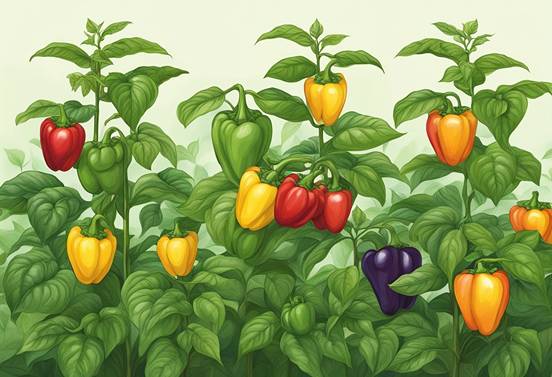
It’s important to understand the nutritional requirements and optimal soil conditions of pepper plants to make informed decisions about using coffee grounds as a supplement.
Coffee grounds are a rich source of nitrogen and contain small amounts of phosphorus and potassium, all of which are crucial for the healthy growth of plants.
Moreover, they help improve soil drainage and aeration, which can encourage better growth of pepper plants.
Key Takeaways
- Coffee grounds can provide essential nutrients for the healthy growth of pepper plants.
- Soil drainage and aeration can be improved through the judicious use of coffee grounds.
- Understanding the soil requirements of pepper plants is crucial for using coffee grounds effectively in the garden.
Soil Requirements for Pepper Plants
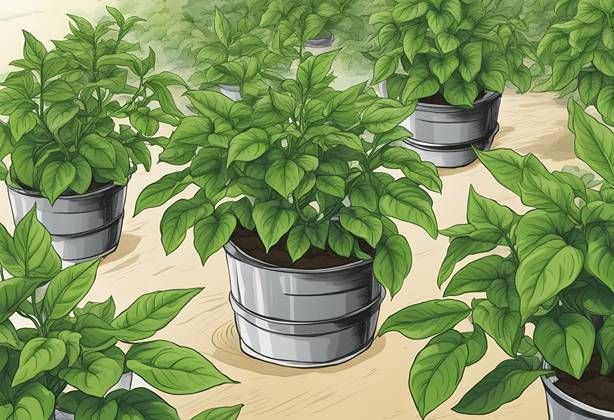
Nutrient Needs
Pepper plants require a well-balanced range of nutrients for healthy growth and development.
The primary nutrients needed by pepper plants are Nitrogen (N), Phosphorus (P), and Potassium (K).
Nitrogen promotes strong vegetative growth, Phosphorus supports root development and flowering, while Potassium ensures overall plant health and disease resistance.
In addition to these primary nutrients, pepper plants also require secondary nutrients such as Calcium, Magnesium, and Sulfur, as well as micronutrients like Iron, Manganese, Zinc, Copper, and Boron.
Organic matter, such as coffee grounds, can provide essential nutrients for pepper plants.
Coffee grounds contain approximately 2% Nitrogen and trace amounts of Phosphorus and Potassium, making them a suitable organic fertilizer for pepper plants when used in moderation.
pH Levels and Acidity
The optimal soil pH for growing pepper plants is between 5.5 and 6.5, favoring slightly acidic conditions. Soil acidity affects nutrient availability and the overall health of pepper plants.
When the soil pH is within the optimal range, the pepper plants can readily access the nutrients they require for growth.
To maintain the desired soil pH, it is important to monitor the soil’s acidity levels regularly and take measures to adjust the pH if needed.
The use of coffee grounds as a soil amendment can help create the required acidic environment for pepper plants.
Besides providing nutrients, coffee grounds assist in improving soil structure, soil aeration, and texture, which are critical for the optimal growth of pepper plants.
In summary, providing the right nutrients and maintaining appropriate soil acidity levels are essential for the successful growth of pepper plants.
Organic matter such as coffee grounds can play a valuable role in achieving these soil conditions.
Proper soil management, including monitoring and adjusting pH levels and ensuring adequate nutrient availability, is critical to supporting the healthy growth of pepper plants.
Do Pepper Plants Like Coffee Grounds?
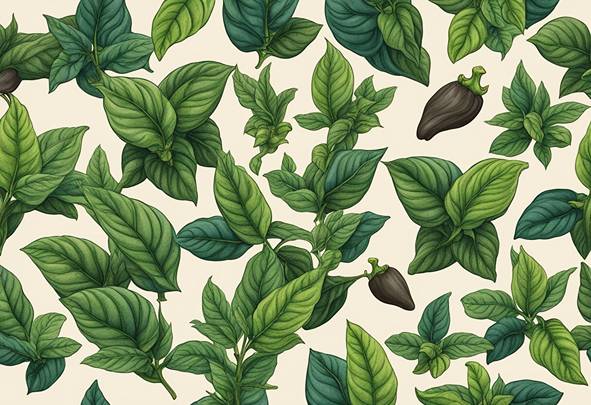
Growth Enhancement
Coffee grounds can be beneficial for pepper plants, since they contain essential nutrients, such as nitrogen, which is crucial for plant growth.
Nitrogen plays a key role in promoting strong and healthy growth, ideal for pepper plants.
Additionally, used coffee grounds can help to create more acidic soil, with a pH range between 5.5 and 6.5, an optimal level for growing pepper plants.
The organic matter in coffee grounds also can improve soil structure by enhancing water retention and aeration.
This makes it easier for plant roots to access moisture and oxygen, stimulating root growth.
Moreover, coffee grounds serve to encourage the presence of earthworms, which can boost soil fertility and further promote healthy pepper plant growth.
Potential Risks and Moderation
While coffee grounds may offer benefits for pepper plants, it is important to use them moderately and responsibly.
Over-application of coffee grounds can lead to phytotoxic effects, causing stunted growth or even death in the plants.
To prevent harmful effects, gardeners should be mindful of how much coffee grounds they incorporate into the soil.
Additionally, it is crucial to ensure proper drainage and avoid soil compaction to minimize potential risks from excessive use of coffee grounds.
It’s also worth noting that coffee grounds break down and decompose over time, so their nutrient and pH-altering benefits will decrease eventually.
In summary, while coffee grounds can offer potential growth and nutrition benefits for pepper plants, it is crucial to use them in moderation and take necessary precautions to avoid potential risks.
Using Coffee Grounds in the Garden
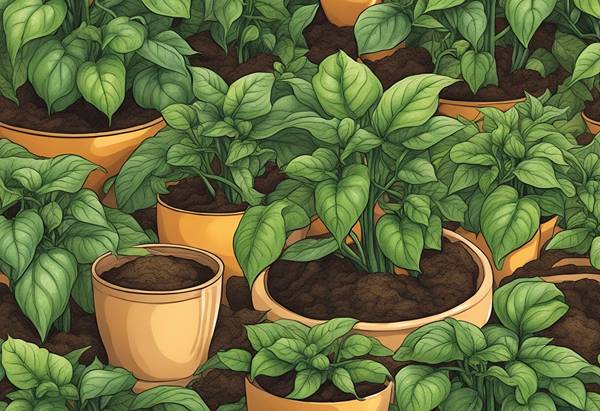
Application Techniques
In gardening, coffee grounds serve as a valuable resource for various applications. Gardeners often use them as a natural fertilizer by sprinkling a thin layer around the base of plants, such as pepper plants.
Watering the plants afterward helps the nutrients in the coffee grounds seep into the soil.
An alternative application method involves steeping coffee grounds in hot water to create a liquid fertilizer which, after straining, can be misted onto plant leaves.
Coffee grounds contain nitrogen, trace amounts of phosphorus, and potassium, along with other micronutrients that benefit pepper plants.
By creating acidic soil with a pH between 5.5 and 6.5, coffee grounds also provide optimal growing conditions for peppers1.
Complementary Organic Materials
In addition to coffee grounds, there is an array of organic materials that gardeners can use for composting or as mulch.
These organic materials can be incorporated into the compost pile or applied directly to plants as a top dressing.
One of the main benefits of using organic materials in gardening is the promotion of a healthy and sustainable ecosystem.
Combining various organic materials such as coffee grounds, eggshells, and banana peels in the garden can provide a rich source of nutrients, helping plants like pepper plants grow stronger and produce a more abundant yield.
Practical Gardening Tips
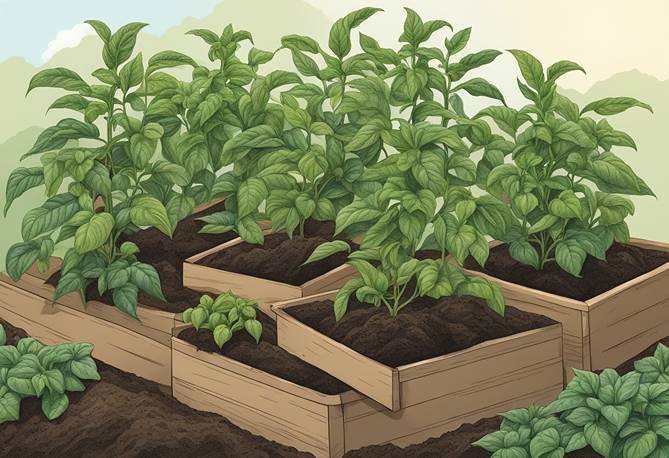
Ideal Plants for Coffee Ground Usage
When it comes to using coffee grounds in the garden, it is essential to know which plants will benefit the most.
Some of the ideal plants for coffee ground usage include acid-loving plants such as roses, azaleas, hydrangeas, lilies, rhododendrons, and blueberries.
These plants thrive in acidic soil conditions, and coffee grounds can help create the desired environment for their growth.
Apart from acid-loving plants, other vegetables such as cabbage, carrots, and radishes can also benefit from the application of coffee grounds.
This is due to the nitrogen content found in coffee grounds, which serves as a natural fertilizer, promoting healthy growth for these plants.
Frequency and Quantity of Application
It’s crucial to use coffee grounds in your gardening efforts with moderation and at the right frequency.
Applying a small amount of coffee grounds every few weeks is often sufficient for most plants.
Overdoing it with the application can lead to negative effects, such as creating overly acidic soil or introducing unwanted pests.
To strike the right balance when using coffee grounds for your plants, consider the following tips:
- Apply coffee grounds as a thin layer on the soil surface, avoiding direct contact with the plant’s stem or base.
- Mix the coffee grounds with compost to help balance the acidity and improve the overall structure of your soil.
- Monitor your plants’ health and growth to determine if adjustments are needed in the coffee ground application.
By following these practical gardening tips, you can effectively utilize coffee grounds to benefit your plants, ensuring their optimal growth and health.
| Aspect | Impact on Pepper Plants |
|---|---|
| Soil Acidity | Coffee grounds can slightly acidify soil, which pepper plants generally prefer as they thrive in slightly acidic to neutral soil. |
| Nutrient Content | Coffee grounds contain nitrogen, potassium, and other minerals beneficial to plant growth, although they are not a complete fertilizer. Pepper plants can benefit from these nutrients. |
| Organic Matter | Coffee grounds add organic matter to the soil, improving its structure and water retention, which can benefit pepper plants. |
| Caffeine | Trace amounts of caffeine in coffee grounds can inhibit seed germination and plant growth if applied in large quantities, so moderation is key. |
| Pest Repellent | Some gardeners believe that coffee grounds can repel pests like slugs and snails, which can be beneficial for pepper plants. |
| Composting | Coffee grounds are a great addition to compost, enriching it with organic matter and nutrients that can benefit pepper plants when the compost is applied to the soil. |
Conclusion
The debate around the use of coffee grounds for pepper plants has garnered attention among gardening enthusiasts.
Coffee grounds are reputed to be beneficial for pepper plants due to their high nitrogen content, which is a crucial nutrient that plants need to grow.
When incorporated into the soil, used coffee grounds can help improve soil structure, increase water retention, and encourage the growth of beneficial microorganisms.
However, it’s important to apply coffee grounds correctly to avoid potential issues.
Mixing coffee grounds directly into the soil or adding them to your compost heap can be an effective way to fertilize your pepper plants.
The grounds are considered “green” compost material, meaning the coffee grounds have a high nitrogen.
This makes them an excellent addition to your compost heap, especially when balanced with “brown” compost materials like dry leaves or paper, which are carbon-rich.
However, caution is advised when applying coffee grounds directly to the soil around your plants. Used grounds are less acidic than fresh ones, but they can still slightly acidify the soil.
While pepper plants typically enjoy slightly acidic to neutral soil, excessive amounts could harm them.
Therefore, it’s recommended to incorporate coffee grounds into your compost rather than applying them directly to the soil in large quantities.
Coffee grounds are indeed popular among gardeners looking to build a more nutrient-rich, sustainable garden.
They’re not just waste but a valuable organic resource that, when used judiciously, can contribute to a thriving garden.
Before beginning to use coffee grounds, consider the specific needs of your pepper plants during the growing season, their indoors or outdoor environment, and the balance of nutrients in your garden soil.
In summary, coffee grounds can be good for pepper plants if used as part of a balanced composting strategy.
They provide extra nitrogen and help improve soil health, which can lead to greener, more productive pepper plants.
Remember to monitor your soil’s acidity and adjust your gardening practices accordingly to ensure your plants receive the best care.
Frequently Asked Questions
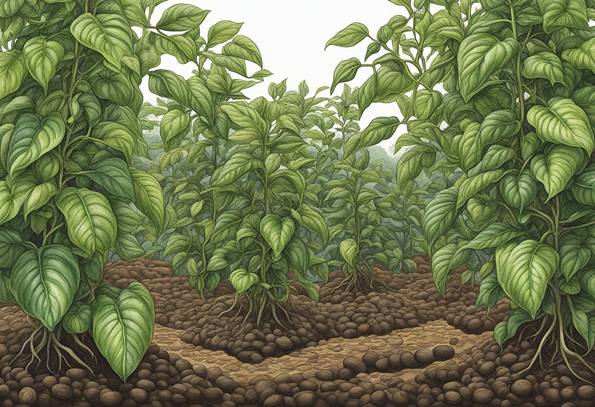
Are coffee grounds good for pepper plant growth?
Yes, coffee grounds can be beneficial for pepper plant growth. They serve as an organic fertilizer by providing nitrogen and trace amounts of phosphorus and potassium, as well as other essential micronutrients that support healthy plant development.
How can coffee grounds affect soil acidity for pepper plants?
Coffee grounds can help create a slightly acidic soil environment, with a pH between 5.5 and 6.5.
This is an optimal pH range for pepper plant growth, ensuring that the plants can efficiently take up nutrients from the soil.
What is the recommended frequency for applying coffee grounds to pepper plants?
There is no strict rule for the frequency of applying coffee grounds to pepper plants. However, it is essential to maintain moderation to avoid any potential harm.
You may add coffee grounds periodically to your compost or spread a thin layer (0.5-1 inch) of coffee grounds on the soil as mulch.
Can coffee grounds help in pest prevention for pepper plants?
Coffee grounds can provide certain pest prevention benefits for pepper plants as they have been reported to repel slugs, snails, and some insects.
The caffeine and other compounds present in coffee grounds may deter these pests. However, further research is needed to confirm the full extent of these pest prevention benefits.
What is the proper method to apply coffee grounds to pepper plants?
For best results, you’re good if you mix regular coffee grounds into your compost to add nutrients to the soil before planting.
Unless, another option is spreading a thin layer of coffee grounds (0.5-1 inch) on the soil surface around your pepper plants as much.
This helps retain moisture, suppress weeds, and regulate soil temperature.
Are there any adverse effects of using coffee grounds on pepper plants?
Excessive usage of coffee grounds can be phytotoxic and negatively affect your pepper plants.
Over-application may lead to issues related to nitrogen toxicity and can also make the soil overly acidic.
Maintaining a balance ensures the soil maintains its pH and nutrient levels, allowing your pepper plants to thrive.

